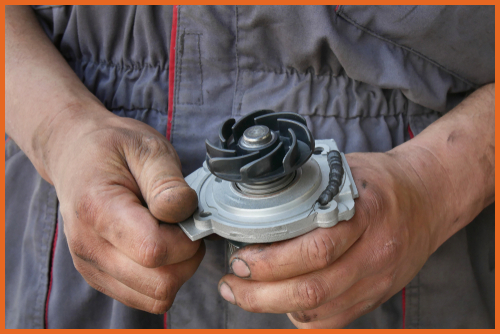The water pump plays a big role in keeping your engine cool. It keeps coolant circulating through the engine and radiator so your vehicle stays at a safe operating temperature. If your water pump breaks down, your engine can overheat fast and that can lead to serious trouble.
In most vehicles, the water pump is powered by either a serpentine or timing belt. When it's working right, coolant flows steadily through the system. But once the pump starts leaking or fails altogether, your engine can overheat in no time. That might lead to damage like a blown head gasket, warped cylinder heads, or even a cracked block (serious damage to the engine).
Signs Your Water Pump Is Failing
Watch for these warning signs that your water pump might be on its way out:
- Coolant Leak: A puddle of bright green or orange fluid under your car could mean a leaky pump seal or gasket.
- Loose or Noisy Axle: If the pulley feels wobbly or squeaky, it might mean worn bearings or belt slippage.
- Squealing or Grinding Sounds: Damaged bearings can make strange noises—don’t ignore them. Left alone, they can lead to engine death.
- White Smoke or Steam: If you see white steam coming from under the hood, overheating could be the cause.
- Temperature Gauge Rising: If the needle on your dashboard creeps up or fluctuates a lot, your water pump could be the culprit.
- Erratic Engine Temperature: Coolant may not be circulating consistently.
Can You Repair a Water Pump?
Technically, yes, but most of the time, it makes more sense to replace it. You could go with a rebuilt pump or a brand-new one.
Rebuilt Pumps - Pros:
- Often cheaper than brand new
- Some mechanics offer in-house rebuilds
Rebuilt Pumps - Cons:
- May not include a solid warranty
- Risk of failure due to reused or low-quality parts
- Durability can vary widely
If your goal is long-term reliability, a new water pump is usually the better bet. And if you're wondering how much to fix a water pump locally, getting multiple repair quotes can give you a better idea of what to expect.
How Much Does It Cost to Replace a Water Pump?
On average, water pump repair costs range from $678 to $811, depending on your car’s make, model, and where you live.
Here’s a rough breakdown:
- Parts: $443 – $515
- Labor: $234 – $296
These prices don’t include taxes or shop fees, and some vehicles cost more depending on how hard the pump is to access. While it’s possible to DIY this repair, it’s not an easy job. If you go that route, make sure you have the right tools and follow all torque specs carefully.
A lot of shops will recommend replacing the timing belt at the same time. Since both parts wear out around the same mileage, it’s often more cost-effective to combine the repairs.
When Should You Replace Your Water Pump?
Most water pumps are built to last 60,000 to 100,000 miles, but driving habits and weather conditions can shorten that lifespan. Mechanics usually recommend replacing it when doing a timing belt job, since the two parts are closely linked.
If your water pump starts leaking or seizes up, coolant won’t flow the way it should. That means your engine could overheat and things can get expensive fast.
What Happens If You Ignore a Bad Water Pump?
Delaying water pump repairs can cause major damage:
- Coolant flow drops or stops completely
- Engine overheats
- Cylinder heads warp
- Head gasket blows
- Engine block cracks
What starts as a $700 fix could balloon into a $4,000+ engine rebuild. That’s why even minor symptoms like a coolant leak from a water pump or sudden engine overheating should be taken seriously.
Can You Drive With a Leaking Water Pump?
Technically? Maybe. But it’s risky and not recommended. A leaking pump affects coolant flow, which leads to overheating. Continuing to drive puts your engine at risk of major damage. It’s better to stop and get it looked at ASAP.
Can I Sell My Car With a Bad Water Pump?
Absolutely. If your vehicle has a bad pump and other underlying issues or it’s just not worth the repair bill you can sell it as-is. DamagedCars. buys cars with all kinds of mechanical problems, including:
- Overheating from pump failure
- Cracked blocks or head gaskets
- Leaking cooling systems
Get an instant offer now and avoid spending more on repairs.
Should You Repair or Sell?
It depends. If your car’s older and the repair costs are nearly as high as the car’s value, selling it might make more sense. Ask yourself:
- Are there other issues beyond the water pump?
- Will repairs actually increase resale value?
- Are you planning to upgrade anyway?
If you said “yes” to any of the above, getting a cash offer might be the smarter move.
Final Thoughts: What to Do About a Failing Water Pump
A bad water pump isn’t something you want to ignore. It can cause serious engine damage if left unchecked. While repairs are often doable, they aren’t always worth it especially if your car’s already showing its age.
Whether you decide to fix it or sell, knowing your options helps you make the right call. And if you’re ready to move on, DamagedCars.com can make the process easy.
Don’t let bad water pump symptoms turn into a bigger repair bill than your car’s worth. Take action early and keep your costs under control.



